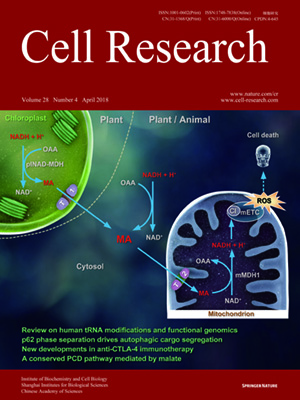
Volume 28, No 4, Apr 2018
ISSN: 1001-0602
EISSN: 1748-7838 2018
impact factor 17.848*
(Clarivate Analytics, 2019)
Volume 28 Issue 4, April 2018: 405-415 | Open Access
ORIGINAL ARTICLES
Polyubiquitin chain-induced p62 phase separation drives autophagic cargo segregation
Daxiao Sun 1, Rongbo Wu 2, Jingxiang Zheng 1, Pilong Li 2 and Li Yu 1,3
1 State Key Laboratory of Membrane Biology, Tsinghua University-Peking University Joint Center for Life Sciences, School of Life Sciences, Tsinghua University, Beijing 100084,China; 2 Beijing Advanced Innovation Center for Structural Biology, Tsinghua University-Peking University Joint Center for Life Sciences, School of Life Sciences, Tsinghua University, Beijing 100084, China and 3 State Key Laboratory of Biomembrane and Membrane Biotechnology, Tsinghua University-Peking University Joint Center for Life Sciences, School of Life Science, Center for Nano/Micro-Mechanics and Multidisciplinary Innovation Research, Beijing 100084, China
Correspondence: Pilong Li (pilongli@mail.tsinghua.edu.cn) or Li Yu (liyulab@mail.tsinghua.edu.cn)
Misfolded proteins can be degraded by selective autophagy. The prevailing view is that ubiquitin-tagged misfolded proteins are assembled into aggregates by the scaffold protein p62, and the aggregates are then engulfed and degraded by autophagosomes. Here we report that p62 forms droplets in vivo which have liquid-like properties such as high sphericity, the ability to undergo fusion, and recovery after photobleaching. Recombinant p62 does not undergo phase separation in vitro; however, adding a K63 polyubiquitin chain to p62 induces p62 phase separation, which results in enrichment of high-molecular weight ubiquitin signals in p62 droplets. Mixing recombinant p62 with cytosol from p62−/− cells also results in p62 phase separation in a polyubiquitination-dependent manner. Mechanistically, p62 phase separation is dependent on p62 polymerization, the interaction between p62 and ubiquitin, and the valence of the polyubiquitin chain. Moreover, p62 phase separation can be regulated by post-translational modifications such as phosphorylation. Finally, we demonstrate that disease-associated mutations in p62 can affect phase separation. We propose that polyubiquitin chain-induced p62 phase separation drives autophagic cargo concentration and segregation.
10.1038/s41422-018-0017-7
FULL TEXT | PDF
Browse 1990


